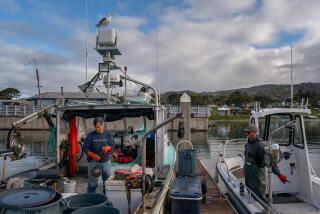REGIONAL REPORT / NEW ENGLAND : As Fortunes Sink, More Fishermen Are Cutting Bait : Stocks like haddock are severely depleted. Officials hope to sharply curtail the catch so industry can recover.
- Share via
GLOUCESTER, Mass. — When he purchased his own fishing boat in 1988, Vito Ferrara dreamed of making his living from the sea, the way his family had for generations.
But, two years later, those dreams have all but run aground as Ferrara struggles to pay his bills on a meager income. “I’m just starting. For me, it’s pretty bad,” Ferrara, 27, said.
His frustration is common among New England fishermen these days, as many face financial hardships severe even for an occupation that is known for its travails.
“This is the worst condition I’ve seen in the fishery in all my life,” said Anthony J. Verga, the 55-year-old chief of a Gloucester commission that aids fishermen. He said that many fishermen have recently sold their boats and others have been repossessed.
Michael Favazza, who owns a Gloucester tavern frequented by fishermen, said: “It seems like every week someone comes in saying he’s giving it up.”
Although diverse factors are contributing to the slump in the Northeast fishing industry--including a regional economic recession--the key one may be a problem that is worrying biologists: the depletion of fish stocks.
The decline is especially marked in groundfish, which include the Atlantic cod, haddock and flounders that have been the traditional mainstays of the New England seafood economy.
Federal figures show that the aggregate New England catch of 10 of the most common groundfish species dropped from 359 million pounds in 1982 to 161 million pounds in 1989. Haddock catches plunged 84% from 1978 to 1988.
Many blame the decline on overfishing that occurred in the wake of the 1977 Magnuson Act, in which the United States claimed a 200-mile fishing zone.
The law, enacted to protect American fishermen from the foreign vessels that were depleting domestic fish stocks, sparked a fishing boom in New England. The region’s fleet was inundated by new boats with highly sophisticated gear.
The increased fishing reduced the region’s fish stocks to levels even below what they had been when the foreign boats departed. Many criticize the New England Fishery Management Council, created to regulate fishing in the new federal zone off New England, for failing to curtail the fishing boom when it had the chance.
The council is composed of representatives of the six New England states, and its rules generally must also be applied in state waters up to three miles off shore.
The council has adopted regulations in recent years that aim to conserve fish stocks by, among other things, limiting the size at which fish may be caught.
But Frederick M. Serchuk, a biologist with the National Marine Fishery Service’s laboratory in Woods Hole, Mass., said such regulations fall short.
Massachusetts officials hope to spur the council to take tougher steps with the release soon of a report by a state groundfish task force.
State Fisheries and Wildlife Commissioner Walter E. Bickford said the panel probably will call for a reduction in fishing of up to two-thirds over the next decade. The task force is considering a variety of ways to do that, including restricting the numbers of people who can fish, in hopes that such measures will forestall widespread financial turmoil in the industry.
Barry Gibson, chairman of the council’s groundfish committee, said the council does not dispute the need for a major reduction in fishing but is searching for a way to accomplish it. “You can’t reduce the industry (by) half and not expect people to be very upset,” he said.
Maine Natural Resources Commissioner William Brennan warned that major forced reductions in fishing could be “absolutely devastating” to the industry. But Bickford, whose task force may propose government “buyouts” for retiring fishermen, said the alternative to action now is the loss of the fisheries in the future.
“We’ve managed that resource like the Brazilians are managing their rain forests,” he said of the fisheries. “We’re basically running it into the ground.”
While they debate how to save the groundfish, officials say not all is bleak for New England’s seafood industry, pointing to growing interest by foreign markets in such non-traditional species as dogfish and skate and the abundance of some traditional species, including lobster.
But that is small comfort to Ferrara, who said even selling his boat to get out of the business was no longer easy. “Nobody wants to buy a fishing boat. They see no future in it,” he said.
More to Read
Sign up for Essential California
The most important California stories and recommendations in your inbox every morning.
You may occasionally receive promotional content from the Los Angeles Times.













